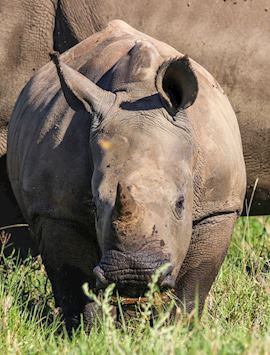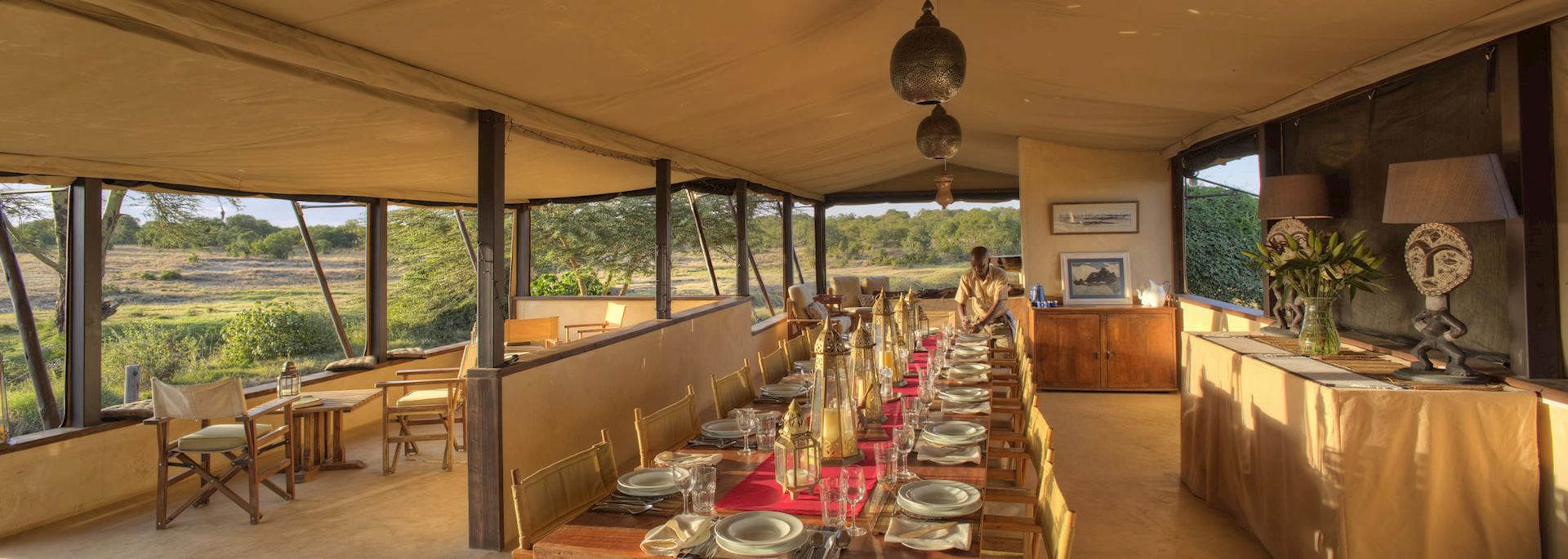
With a secluded location on the banks of the Ewaso Nyiro River, Ol Pejeta Bush Camp feels like a wildlife hideaway. Its seven canvas tents (including one family tent) are well spaced out in leafy surrounds for privacy and have an unpretentious design, adding to the camp’s authentic atmosphere. Each has a furnished private deck and small grassy area next to the river where you can often see animals such as buffalo, impala and kudu on the opposite bank.
The canvas mess tent is raised on stilts and is open and airy, featuring a bar area, a large dining table where three-course lunches and dinners are served, and a small snug area with books, armchairs and Wi-Fi access. Just outside is a campfire where you can share drinks and safari stories with fellow guests each evening.
During the day, you’re kept busy with game drives and walking safaris through the conservancy. You could also take part in additional activities offered on the conservancy for an extra cost, from lion tracking and horse riding to visiting the last surviving northern white rhino in the endangered species enclosure.
We like this camp’s back-to-basics approach, which provides a good level of comfort without taking away from the authenticity of a traditional safari camp. The tents are generous in size, food is of a high quality, and you can watch animals come and go beside the river.
who's been there
-
01993 838 92501993 838 510
- Make an enquiry
Photos of Ol Pejeta Bush Camp
Rooms
Set on wooden decks, the tents are completely made of canvas and designed to leave no trace. Inside, they have a stripped back feel, with simple but sturdy wooden furniture, patterned rugs and an en suite bathroom with traditional bucket shower (staff will fill the bucket with hot water on request, which is then raised up to feed the shower head inside your tent). Blankets and hot water bottles are provided on cooler nights.
The large family tent has two bedrooms, two bathrooms and a living area, accommodating up to six people.
Location
The camp is situated in Ol Pejeta Conservancy in central Kenya’s Laikipia region, right on the Equator. The conservancy is known for its rhino conservation and is home to more than 160 black and white rhino, as well as the last two northern white rhino on the planet. You’ll also see plenty of buffalo, elephant, cheetah and rare northern species including Grevy’s zebra and reticulated giraffe.
Food and drink
- Breakfast is often served in the bush, comprising cereals, fresh fruit, yoghurt, bacon, sausages and bread.
- Three-course buffet lunches of fresh salads, pasta and cheeses are served after your morning activity.
- Before embarking on your afternoon drive you can enjoy tea, coffee and cake in the mess tent.
- After sundowner drinks and snacks out in the bush, you’ll return to a hearty three-course dinner served around the big table.
- Special dietary requirements can be catered to if requested in advance.
Families
- The two-bedroom family tent provides ample space for families of up to six.
- The conservancy runs a Junior Ranger Program for children aged 4 to 12 which includes an activity booklet that you fill in as you explore different points within the conservancy. On completion, you’re sworn in as a junior ranger, receiving a hat, certificate and pin badge.
Facilities and activities
Your stay includes twice-daily game drives with experienced local guides who can help identify and tell you more about the conservancy’s wildlife. Night drives are also possible here, giving you a chance to see nocturnal species and watch as predators embark on night-time hunts. For a change from game drives, you could join a walking safari (guests must be 16 and over to do this), experiencing the sights and sounds of the bush on foot.
The wider conservancy offers additional activities at an extra cost, including lion tracking by vehicle, visiting the endangered species enclosure where the last two northern white rhino are protected, horse riding, visiting the canine anti-poaching unit and joining rangers on a morning run while learning about their work.
Environmental and social responsibility
The camp is predominantly solar powered and no structures are permanent, ensuring minimal disruption to the environment. Alongside its pioneering role in conservation, the conservancy helps to support the local community through its community development initiative, which provides funds toward local education, healthcare and infrastructure. Local farmers are able to graze cattle on the land, which in turns helps to keep the ecosystem healthy for wildlife.
Tour ideas in Ol Pejeta Conservancy
Our itineraries are there to spark ideas for how you could include a stay at Ol Pejeta Bush Camp as part of your trip. Treat them simply as suggestions, because every aspect of the trip we create for you will be yours to define.
Alternative places to stay nearby
Where possible, we like to offer a range of accommodation for each stop of your trip, chosen by our specialists as some of their favourite places to stay. To help you make the right choice, we give each property a rating based on its facilities and service, but we also look for hotels with distinct character or a location that can't be bettered.
-
![Tent at Kicheche Laikipia]() Responsible ChoiceWe've hand-selected a range of tours and stays across the world that go above and beyond to be a force for good by supporting local businesses, educating staff, challenging local norms, or promoting conservation and biodiversity efforts. Your Responsible Choice helps increase the positive impact of your trip.
Responsible ChoiceWe've hand-selected a range of tours and stays across the world that go above and beyond to be a force for good by supporting local businesses, educating staff, challenging local norms, or promoting conservation and biodiversity efforts. Your Responsible Choice helps increase the positive impact of your trip.Kicheche Laikipia
Ol Pejeta Conservancy
Ol Pejeta Conservancy and nearby places
- Sosian Lodge 21 miles away
- Ol Lentille Conservancy 36 miles away
- Il Ngwesi Group Ranch 35 miles away
- Loisaba Wilderness Conservancy 42 miles away
- Lewa Wilderness Conservancy 40 miles away
- Borana Ranch 46 miles away
- Samburu National Reserve 59 miles away
- Lake Nakuru 63 miles away
- Lakes of the Great Rift Valley 64 miles away
- The Laikipia Plateau 66 miles away











